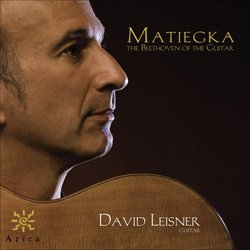| All Artists: Wenzel Thomas Matiegka Title: Wenzeslaus Matiegka: The Beethoven of the Guitar Members Wishing: 0 Total Copies: 0 Label: Azica Original Release Date: 1/1/2009 Re-Release Date: 3/31/2009 Genre: Classical Styles: Chamber Music, Historical Periods, Classical (c.1770-1830) Number of Discs: 1 SwapaCD Credits: 1 UPC: 787867124925 |
Search - Wenzel Thomas Matiegka :: Wenzeslaus Matiegka: The Beethoven of the Guitar
 | Wenzel Thomas Matiegka Wenzeslaus Matiegka: The Beethoven of the Guitar Genre: Classical
|
Larger Image |
CD Details |
CD ReviewsAn excellent effort, but "rediscovery"...? C'mon. Eugene C. Braig IV | Columbus, OH United States | 01/02/2010 (4 out of 5 stars) "I like Leisner's playing: like his tone, like his musical sense of phrasing, like his choices in repertoire... This latest effort brings us a selection of music by Wenzeslaus (Wenzel/Wenzl) Tomas (Thomas) Matiegka (1773-1830), a contemporary of Beethoven perhaps best known for having a chamber "Notturno", op.21, with guitar reset/rearranged by Schubert as the latter's "guitar quartet", D 96. Unlike many of his late classical/early romantic guitarist contemporaries, Matiegka had a penchant for full-scale, multi-movement works.
The disc opens with the Grand Sonata No.1, a quality work in three movements. While the liner notes' assertion that this is "surely one of the best, if not the best guitar sonata of the 19th century" may be a bit of an overstatement, the sonata certainly is at least good in comparison to others of the era. Frankly, the multi-movement sonatas of Sor, Giuliani, or even the more professional-caliber works by Carulli in the genre seem to me to offer more sophistication. Rather than the thematic development associated with sonata form, Matiegka's opening Maestoso introduces (and occasionally reintroduces) a string of inventive, miniature guitaristic themes with only minimal effort at development. The sonata's slow movement is lush and pleasant, and the closing rondo is pleasantly lively. Because the Grand Sonata No.2 "is not nearly, to [Leisner's] ear, the equal" of the first, this recording only offers us the slow movement, Andante con espressione, from the second Grand Sonata. Personally, I would have gladly sacrificed the small stack of Minuet bonbons offered later on this disc in favor of the omitted movements of the Grand Sonata No.2. Substantial, multi-movement works for solo guitar from this era simply aren't common enough to be excerpted away. The Tyrolean variations, op.27, are expertly performed, but the music itself is not as interesting or excitingly virtuosic as de Fossa's (1775-1849) solo guitar setting of the same theme. Matiegka's B minor Sonata, op.31, no.6, is unusual in not including a slow movement. This sonata is pleasant, but a more superficial work than the Grand Sonata recorded in whole here. The disc closes with several miniature Minuets and lushly harmonious, slow, chordal Etude. As always, Leisner's musically perceptive interpretation is a joy to hear. However, the recording is engineered so the guitar tone sounds slightly "nasal" in forte, especially the trebles. Leisner tends to alienate me in his style of self promotion. The liner notes make a great deal of Matiegka's music being Leisner's latest "rediscovery." The statement that Matiegka is "little-known in European guitar circles and virtually unknown in the US" seems true enough. However, when coupled with frequent assertions of "rediscovery", this could be perceived as an affront to the excellent guitarists who have been recording and/or performing Matiegka's music for the last decade or two: guitarists like Falletta, Chivers, Agostinelli, Maruri, Yates, etc. No, these efforts have not received the kind of attention the repertoire chosen to be championed by Bream or Williams does...frankly, they have not received the attention they deserved. However, completely overlooking them (as far as I can tell, based upon the fact that they aren't as well-known as deserved) to loudly tout one's own "rediscovery" seems to me just a little rude. Still, if you are a fan of 19th-c. guitar music performed on modern instruments, buy the disc: it's good enough. Just don't buy the hype that comes with it." |

 Track Listings (12) - Disc #1
Track Listings (12) - Disc #1